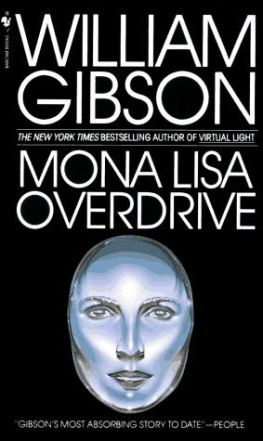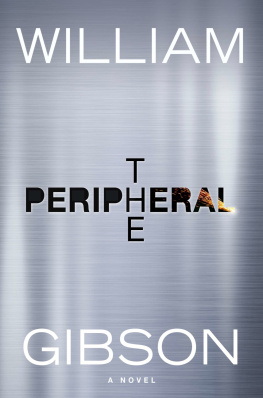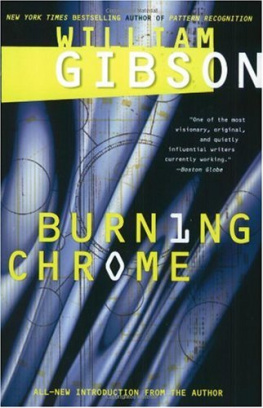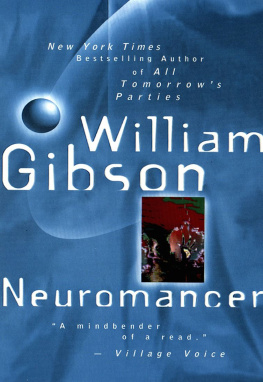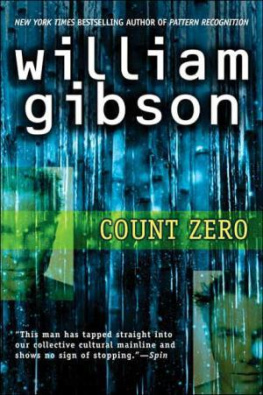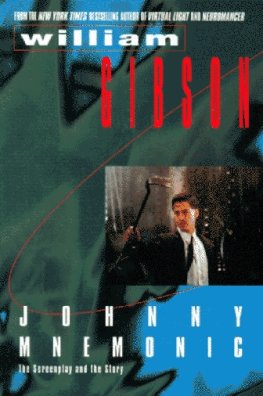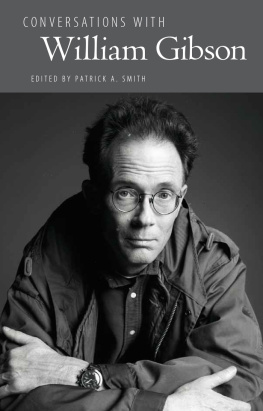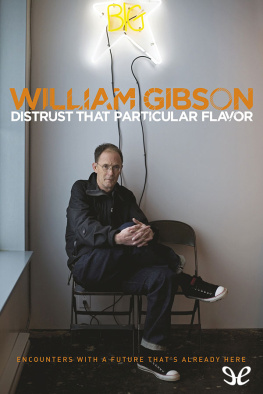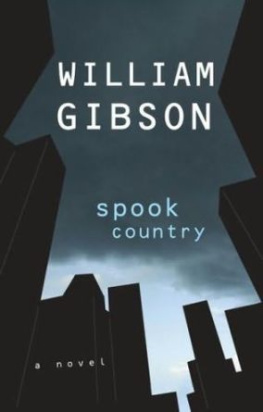William Gibson - Idoru
Here you can read online William Gibson - Idoru full text of the book (entire story) in english for free. Download pdf and epub, get meaning, cover and reviews about this ebook. year: 2000, publisher: Penguin Books, genre: Art. Description of the work, (preface) as well as reviews are available. Best literature library LitArk.com created for fans of good reading and offers a wide selection of genres:
Romance novel
Science fiction
Adventure
Detective
Science
History
Home and family
Prose
Art
Politics
Computer
Non-fiction
Religion
Business
Children
Humor
Choose a favorite category and find really read worthwhile books. Enjoy immersion in the world of imagination, feel the emotions of the characters or learn something new for yourself, make an fascinating discovery.

- Book:Idoru
- Author:
- Publisher:Penguin Books
- Genre:
- Year:2000
- Rating:3 / 5
- Favourites:Add to favourites
- Your mark:
- 60
- 1
- 2
- 3
- 4
- 5
Idoru: summary, description and annotation
We offer to read an annotation, description, summary or preface (depends on what the author of the book "Idoru" wrote himself). If you haven't found the necessary information about the book — write in the comments, we will try to find it.
Idoru — read online for free the complete book (whole text) full work
Below is the text of the book, divided by pages. System saving the place of the last page read, allows you to conveniently read the book "Idoru" online for free, without having to search again every time where you left off. Put a bookmark, and you can go to the page where you finished reading at any time.
Font size:
Interval:
Bookmark:
PENGUIN BOOKS
IDORU
Gibson's mixture of science fiction and soon-to-be-fact is as enthralling as ever, and his take on Tokyo reality virtual and otherwise is jaw-droppingly intimate. The master at work
Maxim
Gibson's inventiveness is a sublime amalgam of high-tech and kitsch This novel confirms its author as a pioneering topographer of cyberspace it would be hard to think of a writer who does more to test the value of the tangible
David Profumo in the Daily Telegraph
The poet of cyberspace What Gerald Manley Hopkins did for the flight of the falcon, Turner for fog, Dali for the unconscious and William Burroughs for a brain deranged by junk, Gibson has done for the digital dimension. He has painted it for us so vividly and persuasively that those dreary keyboards and screens can never be the same again
Peter Popham in the Independent
Cleverly politicised, and as fast, witty and lovingly painted as ever For all his futuristic wizardry, William Gibson's most prized tool is still the obsolescence-proof technology of words
Steven Poole in the Guardian
Idoru confirms Gibson as, virtually, a realist writer for the post-Net generation, offering a new mimesis that opens windows on our on-screen world
Paul Quinn in The Times Literary Supplement
ABOUT THE AUTHOR
William Gibson is the award-winning author of Neuromancer; Mona Lisa Overdrive; The Difference Engine, with Bruce Sterling; Virtual Light; Burning Chrome, a collection of short stories; and All Tomorrow's Parties. He lives in Vancouver, Canada.

PENGUIN BOOKS
PENGUIN BOOKS
Published by the Penguin Group
Penguin Books Ltd, 80 Strand, London WC2R 0RL, England
Penguin Putnam Inc., 375 Hudson Street, New York, New York 10014, USA
Penguin Books Australia Ltd, 250 Camberwell Road, Camberwell, Victoria 3124, Australia
Penguin Books Canada Ltd, 10 Alcorn Avenue, Toronto, Ontario, Canada M4V 3B2
Penguin Books India (P) Ltd, 11 Community Centre, Panchsheel Park, New Delhi 110 017, India
Penguin Books (NZ) Ltd, Cnr Rosedale and Airborne Roads, Albany, Auckland, New Zealand
Penguin Books (South Africa) (Pty) Ltd, 24 Sturdee Avenue, Rosebank 2196, South Africa
Penguin Books Ltd, Registered Offices: 80 Strand, London WC2R 0RL, England
www.penguin.com
First published in the United States of America by G. P. Putnam's Sons 1996
Published in Great Britain by Viking 1996
Published in Penguin Books 1997
Copyright William Gibson, 1996
All rights reserved
The moral right of the author has been asserted
Except in the United States of America, this book is sold subject to the condition that it shall not, by way of trade or otherwise, be lent, re-sold, hired out, or otherwise circulated without the publisher's prior consent in any form of binding or cover other than that in which it is published and without a similar condition including this condition being imposed on the subsequent purchaser
ISBN: 978-0-14-191001-7
for Claire
Sogho Ishii, the Japanese director, introduced me to Kowloon Walled City via the photographs of Ryuji Miyamoto. It was Ishii-san's idea that we should make a science fiction movie there. We never did, but the Walled City continued to haunt me, though I knew no more about it than I could gather from Miyamoto's stunning images, which eventually provided most of the texture for the Bridge in my novel Virtual Light.
Architect Ken Vineberg drew my attention to an article about the Walled City in Architectural Review, where I first learned of City of Darkness, the splendid record assembled by Greg Girard and Ian Lambrot (Watermark, London, 1993). From London, John Jarrold very kindly arranged for me to receive a copy.
Anything I know of the toecutting business, I owe to the criminal memoirs of Mark Brandon Chopper Read (Chopper from the Inside, Sly Ink, Australia, 1991). Mr. Read is a great deal scarier than Blackwell, and has even fewer ears.
Karl Taro Greenfeld's Speed Tribes (HarperCollins, New York, 1994) richly fed my dreams of Laney's jet lag.
Stephen P. (Plausibility) Brown rode shotgun on the work in progress for many months, commenting daily, sometimes more often, and always with a fine forbearance, as I faxed him a bewildering flurry of disconnected fragments he was somehow expected to interpret as progress. His constant encouragement and seemingly endless patience were absolutely essential to this book's completion.
My publishers, on both sides of the Atlantic, also demonstrated great patience, and I thank them.
After Slitscan, Laney heard about another job from Rydell, the night security man at the Chateau. Rydell was a big quiet Tennessean with a sad shy grin, cheap sunglasses, and a walkie-talkie screwed permanently into one ear.
Paragon-Asia Dataflow, Rydell said, around four in the morning, the two of them seated in a pair of huge old armchairs. Concrete beams overhead had been hand-painted to vaguely resemble blond oak. The chairs, like the rest of the furniture in the Chateau's lobby, were oversized to the extent that whoever sat in them seemed built to a smaller scale.
Really? Laney asked, keeping up the pretense that someone like Rydell would know where he could still find work.
Tokyo, Japan, Rydell said, and sucked iced latte through a plastic straw. Guy I met in San Francisco last year. Yamazaki. He's working for 'em. Says they need a serious netrunner.
Netrunner. Laney, who liked to think of himself as a researcher, suppressed a sigh. Contract job?
Guess so. Didn't say.
I don't think I'd want to live in Tokyo.
Rydell used his straw to stir the foam and ice remaining at the bottom of his tall plastic cup, as though he were hoping to find a secret prize. He didn't say you'd have to. He looked up. You ever been to Tokyo?
No.
Must be an interesting place, after that quake and all. The walkie-talkie ticked and whispered. I gotta go on out and check the gate by the bungalows now. Feel like coming?
No, Laney said. Thanks.
Rydell stood, automatically straightening the creases in his khaki uniform trousers. He wore a black nylon web-belt hung with various holstered devices, all of them black, a short-sleeved white shirt, and a peculiarly immobile black tie. I'll leave the number in your box, he said.
Laney watched the security man cross the terra cotta and the various rugs, to vanish past the darkly polished panels of the registration desk. He'd had something going on cable once, Laney had gathered. Nice guy. Loser.
Laney sat there until dawn came edging in through the tall, arched windows, and Taiwanese stainless could be heard to rattle, but gently, from the darkened cave of the breakfast room. Immigrant voices, in some High Steppe dialect the Great Khans might well have understood. Echoes woke from the tiled floor, from the high beams surviving from an age that must once have seen the advent of Laney's kind or predecessors, their ecology of celebrity and the terrible and inviolable order of that food chain.
Rydell left a folded sheet of Chateau notepaper in Laney's box. A Tokyo number. Laney found it there the next afternoon, along with an updated estimate of his final bill from the lawyers.
He took them both up to the room he could no longer even pretend to afford.
A week later he was in Tokyo, his face reflected in an elevator's gold-veined mirror for this three-floor ascent of the aggressively nondescript O My Golly Building. To be admitted to Death Cube K, apparently a Franz Kafka theme bar.
Font size:
Interval:
Bookmark:
Similar books «Idoru»
Look at similar books to Idoru. We have selected literature similar in name and meaning in the hope of providing readers with more options to find new, interesting, not yet read works.
Discussion, reviews of the book Idoru and just readers' own opinions. Leave your comments, write what you think about the work, its meaning or the main characters. Specify what exactly you liked and what you didn't like, and why you think so.

